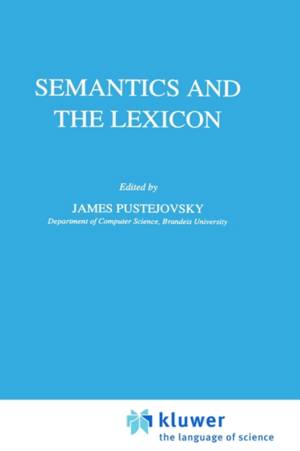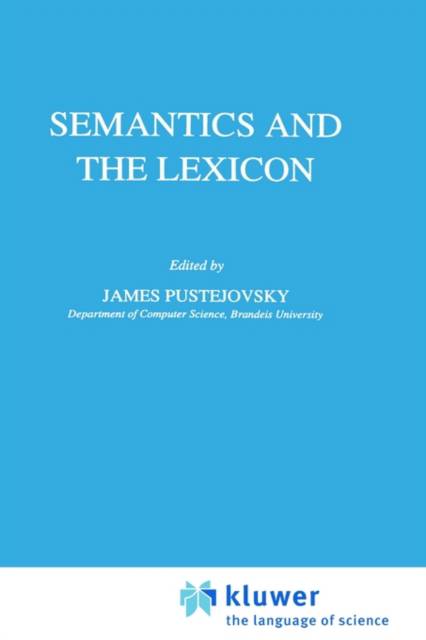
- Afhalen na 1 uur in een winkel met voorraad
- Gratis thuislevering in België vanaf € 30
- Ruim aanbod met 7 miljoen producten
- Afhalen na 1 uur in een winkel met voorraad
- Gratis thuislevering in België vanaf € 30
- Ruim aanbod met 7 miljoen producten
Zoeken
Semantics and the Lexicon
€ 153,95
+ 307 punten
Omschrijving
This book integrates the research being carried out in the field of lexical semantics in linguistics with the work on knowledge representation and lexicon design in computational linguistics. Rarely do these two camps meet and discuss the demands and concerns of each other's fields. Therefore, the book is interesting in that it provides a stimulating and unique discussion between the computational perspective of lexical meaning and the concerns of the linguist for the semantic description of lexical items in the context of syntactic descriptions.
The volume is divided into three sections. Part one deals with the fundamentals of lexical structure and what constitutes a lexical semantic representation for a grammatical theory. Part two deals with the specific mappings that are necessary from a lexical semantic representation to the syntax. Finally, Part three addresses the possibility of modeling lexical knowledge with computational uses in mind. The unifying assumption behind all these works is that methodologies in computational linguistics and theoretical linguistics have converged, and that the goals of both fields are the same: to investigate the phenomenon of language in a rigorous and analytic way, for the purpose of establishing how it fits into the larger domain of intelligent human behavior.
The volume is divided into three sections. Part one deals with the fundamentals of lexical structure and what constitutes a lexical semantic representation for a grammatical theory. Part two deals with the specific mappings that are necessary from a lexical semantic representation to the syntax. Finally, Part three addresses the possibility of modeling lexical knowledge with computational uses in mind. The unifying assumption behind all these works is that methodologies in computational linguistics and theoretical linguistics have converged, and that the goals of both fields are the same: to investigate the phenomenon of language in a rigorous and analytic way, for the purpose of establishing how it fits into the larger domain of intelligent human behavior.
Specificaties
Betrokkenen
- Uitgeverij:
Inhoud
- Aantal bladzijden:
- 420
- Taal:
- Engels
- Reeks:
- Reeksnummer:
- nr. 49
Eigenschappen
- Productcode (EAN):
- 9780792319634
- Verschijningsdatum:
- 31/08/1993
- Uitvoering:
- Hardcover
- Formaat:
- Genaaid
- Afmetingen:
- 156 mm x 234 mm
- Gewicht:
- 775 g

Alleen bij Standaard Boekhandel
+ 307 punten op je klantenkaart van Standaard Boekhandel
Beoordelingen
We publiceren alleen reviews die voldoen aan de voorwaarden voor reviews. Bekijk onze voorwaarden voor reviews.










